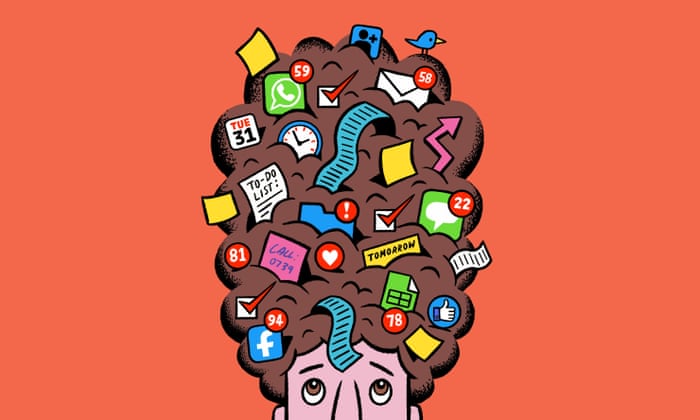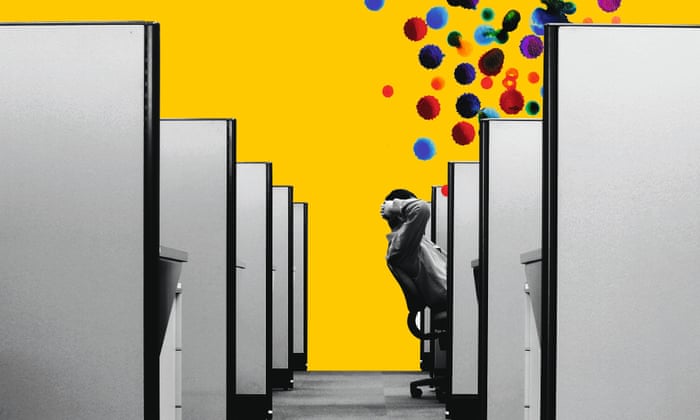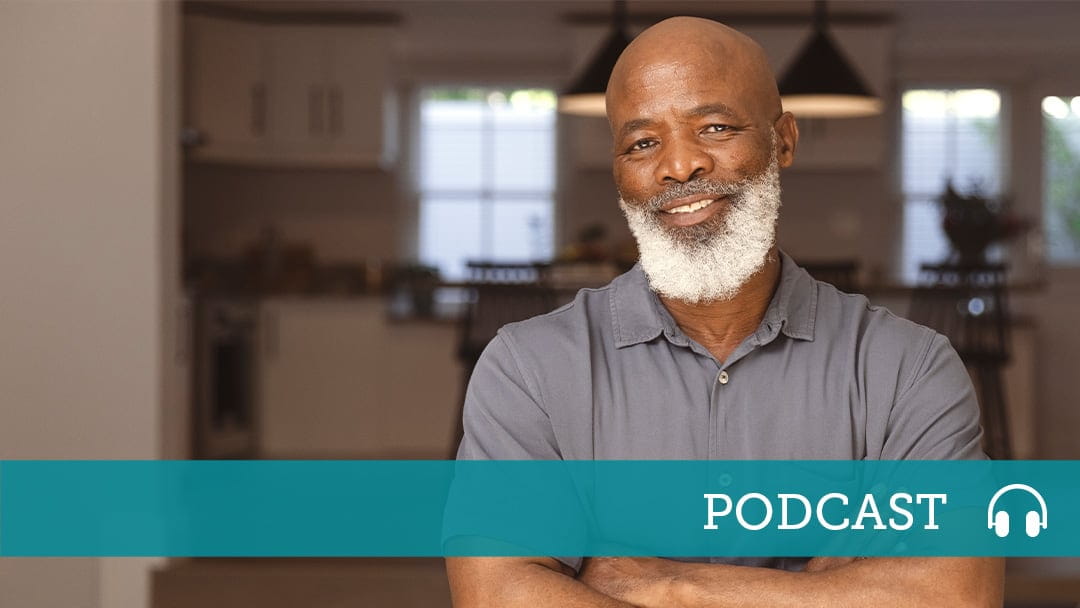
There’s a affordable likelihood you’re studying this whereas doing a number of different factor – maybe switching between work emails and social media, or utilizing it as a approach to delay at present’s gargantuan to-do checklist. We live by an period by which there are such a lot of calls for on us, whether or not it’s the trivial – countless notifications out of your most annoying WhatsApp group – or extra critical, akin to caring duties or monetary or work stresses. If you’re feeling overwhelmed, you aren’t the one one.
Linda Blair, a scientific psychologist and writer of The Key to Calm, says: “I’m getting a whole lot of it in my clinic.” Some folks really feel paralysed, she says, and may’t determine what to do subsequent. “Numerous my purchasers say they’ve hassle ending anyone factor, in order that leaves them feeling increasingly more ineffective.” It’s demoralising, “and it’s not their fault”. It’s not even the fault of the duties, she says, which don’t essentially appear, to an outsider, that demanding. Blair thinks it’s a difficulty of sheer quantity, including: “I believe our consideration span has already been challenged through the use of screens a lot.” The pandemic hastened this, nevertheless it didn’t invent overwhelm. “The issue is managing trendy life.”
Though all of them appear utterly calm and composed, later it strikes me as becoming that all of the consultants I communicate to for this piece is juggling a number of calls for – one calls at evening whereas she is making ready for a journey to a household marriage ceremony the following day, one other solutions the cellphone between breaks at a convention, one other speaks early within the morning with the sounds of household life within the background.
Overwhelm isn’t a prognosis; it could possibly really feel totally different for various folks and there aren’t figures for the quantity experiencing it. To go by the latest annual world stress survey by Ipsos, practically two-thirds of individuals have skilled the form of stress that has an affect on their day by day life. Is overwhelm simply one other title for stress? “I believe any time anybody is feeling overwhelmed they’re prone to be experiencing stress,” says Faye Begeti, a neurology physician and neuroscientist. “However folks can have stress with out feeling overwhelmed – all of us reply in a different way to stress.”
Blair says: “We’re continually launched to challenges, threats, no matter you need to name it, in a number of areas of our life. We’re receiving info within the information that makes us anxious, however we are able to’t do something about it. We’re monitoring our children an enormous quantity greater than we used to. We really feel obliged to reply emails way more rapidly than we ever felt obliged to reply put up. It’s not that there’s anyone factor that we’re being requested to do … it’s that there are a number of calls for on our consideration, with the additional stress of our brains being taught to be distractible [by devices and algorithms], that’s making folks get overwhelmed.” We all know now that multitasking doesn’t work, Blair factors out. “We can not do a couple of factor at a time and but we’re being requested to.”
The pulls needn’t be emotionally and bodily demanding, akin to caring duties or lengthy hours in low-paid work. Even simply the sense – in a world the place it’s by no means been simpler to be taught a brand new language, or hearken to every thing Bach ever wrote, or grasp YouTube pilates – that we’re not utilizing our time productively sufficient may be overwhelming.
“We’re introduced with a lot proof of alternatives that we could possibly be taking, whether or not that’s a facet hustle, or with health, or with cash, or no matter it’s,” says Alice Boyes, a former scientific psychologist and the writer of Stress-Free Productiveness. “The worry of lacking out can improve that sense of overwhelm.” Is it rising? “I believe that there’s definitely an argument for that. I believe lots of people tackle a whole lot of totally different roles and calls for improve.”
Overwhelm occurs, says Begeti, “when calls for exceed our capability, which may be both short-term or continual. Overwhelm typically includes juggling quite a few calls for that exceed what we are able to fairly deal with. This could possibly be associated to work, private duties or a mixture of each. It’s the sensation that regardless of how a lot we attempt to handle, we merely can’t sustain.” Begeti is the writer of The Cellphone Repair: The best way to Rework Your Smartphone Habits, however she is evident that whereas telephones and know-how can exacerbate the sense of overwhelm – we are able to match duties into any spare second by whipping out our telephones – they aren’t essentially the trigger for everybody. “It’s extra about what number of roles we are attempting to fill concurrently – professionally and personally – and the stress to maintain up with all of them.”
A problematic cellphone behavior could be a signal of escapism once we are feeling overwhelmed, however it could possibly additionally find yourself including to overwhelm. The pandemic resulted in a big improve in display use, whereas the stress and uncertainty of the interval (and the doable results of lengthy Covid) exhausted folks’s “government perform” – the a part of our mind that plans, makes selections and regulates feelings. The time period “mind fog”, with its decreased consideration span and poor reminiscence, grew to become wearily acquainted.
Overwhelm is draining. Begeti describes it equally to psychological fatigue, the place “there’s a discount in activation of the prefrontal cortex, the a part of the mind liable for advanced considering and decision-making”. She provides: “On this state, we are inclined to lose a few of our potential to suppose clearly and train willpower. Persons are extra prone to procrastinate or act on autopilot, making impulsive selections or reaching for short-term rewards as a substitute of contemplating long-term penalties. Emotion regulation additionally turns into tougher, resulting in irritability, frustration and an elevated probability of unfavourable self-talk, with ideas like ‘I’m not ok’ turning into extra outstanding.”
There are bodily results, too: continual stress can have quite a few unfavourable penalties on well being, akin to elevating the chance of diabetes and coronary heart illness. The signs of continual stress within the mind, akin to decreased focus and worsening reminiscence, may be extreme sufficient, Begeti says, “that persons are referred to a neurological reminiscence clinic with the concern that they’re struggling with dementia”.
Begeti describes the state of overwhelm as “low‑energy mode”. “When the mind is fatigued, it tries to preserve power to retain some capability for potential emergencies,” she says. Brief-term overwhelm, she says, is reversible with enough relaxation. “Nevertheless, if the overwhelm turns into continual burnout, restoration can take rather a lot longer.” Recharging actions “that restore our psychological power” are important, she provides. “These will probably be totally different for everybody, however can embrace train, spending time with family members, participating in satisfying actions or just not having to reply to each message or e-mail instantly. Common relaxation and restoration are key.”
Blair factors out that it’s not possible for many people to swap a smartphone for a “brick” cellphone and says now we have to simply accept that “the world is totally different now”. As an alternative, we have to handle the calls for on us, wherever doable: “We’ve got to take a whole lot of breaks and now we have to remain accountable for our personal timetable as a lot as we presumably can.” Make sure you get sufficient good-quality sleep, she provides: “As soon as folks really feel capable of focus, the following step is to prioritise the issues that it’s good to do – and the extra you’re rested, the simpler it’s to get them performed and get again on observe.”
Typical time-management options are usually not the reply, says Boyes. “We frequently have these ‘shoulds’ and a whole lot of them are perpetuated by productiveness myths,” she says. Usually, these are espoused by individuals who are inclined to have “a whole lot of privilege and don’t have a whole lot of duty or challenges, like sick kids or sick dad and mom, or issues breaking down that you may’t afford to repair, and subsequently may be like this extremely constant machine”. Be certain, says Boyes, “that what you’re reacting to is actuality and never assumptions or ‘shoulds’”.
Together with a way of tension, overwhelm tends to return with rumination and avoidance, she says, which then perpetuates the issue. It might probably result in a lack of confidence and “a mismatch between the calls for and your sense of your potential to manage”. To interrupt that cycle and nudge us into motion, Boyes suggests asking what’s the greatest choice we are able to make. “Usually, once we get into these states, we take into consideration all of the issues now we have performed to land us on this mess. However we ought to be asking: ‘What’s the very best choice I could make proper now within the scenario I’m in?’ Typically, it’s simply getting the ball rolling doing the smallest productive factor that may help.”
Even these with larger sources, who appear ruthlessly organised and environment friendly, should expertise overwhelm at instances – remarkably, they’re human, like the remainder of us. “Setting real looking expectations for ourselves may help,” says Begeti. “Probably the most essential steps in stopping overwhelm is recognising that we don’t have limitless psychological power.”









